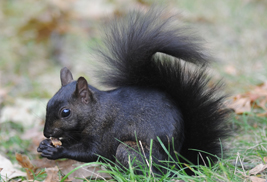Featured Article
Risman Plaza Construction Nearly Complete
The remaining improvements to Risman Plaza are being completed just as students, faculty and staff return to campus. The construction is part of the university's campuswide $200 million renovation plan, and is expected to be fully complete by Homecoming.
read moreKent State's Unofficial Mascot to Celebrate 50 Years on Campus
Posted Aug. 30, 2010 They're everywhere, and have been for almost 50 years.
They're everywhere, and have been for almost 50 years.Take a stroll on campus, and it's hard to go far without spotting a black squirrel darting among passersby, hopping from tree to tree or nibbling on a nut.
Once nonexistent in this area, the now ubiquitous black squirrel is affectionately considered Kent State University's unofficial mascot, and 2011 celebrates the bushy-tailed creatures' 50th anniversary in Kent.
The availability of stuffed toy versions of the black rodent in campus bookstores, the recent black squirrel statute-decorating contest, Black Squirrel Radio and the Annual Black Squirrel Festival are clear indications that the black squirrels are a staple both on and off campus and engender fond memories of Kent State.
Even more interesting than their prominence, is how they ended up in Kent.
The creatures were imported to campus as the mission of "Operation Black Squirrel" in 1961, in which Larry Wooddell, then the campus ground superintendent and "Biff" Staples, a retired Davey Tree employee, personally delivered the furry critters from Canada.
Wooddell had first seen the black squirrels when traveling in the late 1950s through Chardon, a small rural town 30 miles northeast of Kent. In a September 1982 article in the Daily Kent Stater, Wooddell was described as being confused by the squirrels' unique color and startled by their struggle to escape hunters.
Scarce in number and greatly outnumbered by predators in mid-20th century Chardon, the black squirrels eventually were killed off in the area. Taken by the rare-colored creatures, Wooddell began to search elsewhere for them. He enlisted the help of his friend, Staples, who discovered an abundance of them in Ontario, Canada on a business trip.
"Operation Black Squirrel" was born.
Based on Staples' discovery, the pair handled the complicated task of transporting the squirrels from Ontario to Kent, which involved correspondence with the United States and Canadian governments over six months.
The plan proved successful. In early 1961, the pair drove to Ontario in a station wagon to pick up 10 squirrels that had been trapped by Canadian wildlife authorities. Then, they returned to campus hauling the furry cargo in individual cages. Once back in Kent, the black squirrels were released, and the rest, as they say, is history.
If it were not for Wooddell and Staples' diligence in cutting through all the red tape, Kent State may not be paying homage today to the black squirrel.
Every September the uncommon creatures are honored at the annual Black Squirrel Festival, which is organized by the Kent Student Center Programming.
Tessa Saylor, student co-manager at the student center programming, says the spirit of how Kent has adopted the black squirrel inspires the festival, which is in its 29th year.
"The mission of the festival has been to welcome both new students and returning students to Kent State University and the local community, kind of like how we've welcomed the squirrel itself," Saylor says. "The festival includes local entertainment and vendors. Many of the student organizations also come to the festival."
The 29th Annual Black Squirrel Festival is Sept. 10 from 10 a.m. to 5 p.m. in Manchester Field and the Memorial Gardens, adjacent to the Kent Student Center.
In the first few decades of the squirrels' existence on campus, grounds maintenance helped ensure their comfort and well being by installing food baskets and nesting boxes high up in the trees. It was learned that the squirrels preferred to feast on corn.
Nowadays, the critters fend for themselves.
"It's survival of the fittest," says Heather White, manager of campus environment and operations. "The food baskets were removed, and we don't feed wildlife anymore. They have to fend for themselves."
In numerous articles written about the squirrels in the past, they are often described as "the unofficial mascots, famous campus residents, and peculiar, annoying, amazing and even troublesome."
Unlike the staff in years past, who complained of the squirrels being pests by getting caught in heating unit grills or in buildings where holes lure them in for warmth, White says her staff hasn't had any first-hand experience or issues with the squirrels.
The furry residents' reputation as being unfriendly or mean as described in some old news or academic articles is also something White says she hasn't encountered.
It seems after their five-decade occupation of Kent, the black squirrels are finally doing what Wooddell hoped they would.
A 1961 article that appeared in the Record Courier said, "Wooddell, pleased that campus now has a colony of rare squirrels, believes they will take kindly to KSU surroundings."
And, so it appears they have.
By Erin C. Perkins